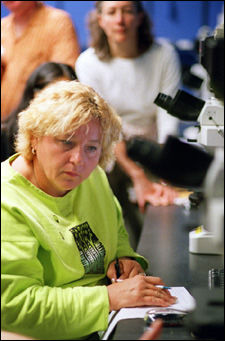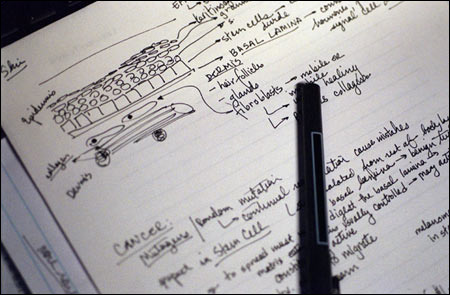High school teachers learn cancer science:
Regional high school teachers learn latest science, techniques at MCB outreach

Five high school science teachers peered into microscopes at the Science Center Friday (July 11) while others who had crowded into the small microscopy lab looked over their shoulders or at the computer screens nearby displaying images of stained skin cells.
After learning about cancer all week from Harvard professors, the teachers were using antibodies to examine several proteins, known to be linked with certain types of cancer, in cells.
“It’s been marvelous,” said Sister Alice Lyon, who teaches at Sacred Heart High School in Kingston, Mass. “Each lecturer has gently led us from what is known to what is [becoming known].”
Lyon and 17 other teachers from Massachusetts, New Hampshire, and Rhode Island are taking part in a two-week outreach program sponsored by the Harvard Department of Molecular and Cellular Biology (MCB) and the Howard Hughes Medical Institute. The program, which ends July 18, aims to expose teachers to cutting-edge research and to engage them in a process of developing quality materials to teach science at the high school level.

That engagement is what makes this year’s program different, according to Director Robert Lue, senior lecturer on molecular and cellular biology. Lue said this year marks the beginning of an effort to develop quality science education materials aimed at high school teaching.
Often, he said, such materials are created for college-level classes and then adapted for high school teaching. Unfortunately, he said, that often means the material is not right for the audience.
In addition to educating participants about the latest developments in cancer research, this year’s workshop will tap their teaching knowledge and focus on developing lesson plans and creating animated teaching tools. Participants will bring those lessons and animations back to the schools with them, but they’ll also be posted on the Web and made available to science teachers across the country.
By adding new material each year, Lue said, MCB and participating teachers will be building a resource that helps improve science teaching across the country.
This is part of a wider effort by MCB to support high school biology teachers at what Lue described as a critical time. Science teaching today, Lue said, is beset by the conflicting forces of rapid advancement in science, which requires more effort, energy, and attention by teachers to convey to students the latest discoveries. Tight fiscal times add to the pressure, forcing many schools and science departments to do more with less.
“High schools are beginning to feel they’re losing touch with what students need to know in preparation for college,” Lue said. “Making sure that science teaching has appropriate support in high school is more important now than in the past. MCB feels it is critical that we give back to teaching at other levels.”
The summer program is the third part of a revamped outreach effort by the department that began in September, according to MCB Outreach Coordinator Tara Bennett. The first part, Bennett said, began last fall, when 70 teachers participated in a workshop focusing on developmental biology. It continued this spring when 350 high school students participated in four different laboratory programs.
Bennett said this summer’s program attracted 156 applications, from which 18 teachers were selected. The educators represent a broad spectrum, from second-year teachers to 30-year classroom veterans who hail from public, private, and parochial schools.
“These are motivated teachers who want to keep up with what’s happening and bring that back to their classes,” Bennett said.
Participants in this summer’s workshop said during Friday’s lab that they found it personally enriching and energizing as well as useful in crafting future lessons. They also said that, with the pace of scientific discovery increasing, they have to work harder to stay up-to-date and to present recent developments to their students in interesting ways.
“I find in class when kids can really get into [the subject] and be hands-on, they’re much more engaged,” Lyon said. “That requires us to be a half a step ahead.”
Debra Capuano-Ajaj, a biology teacher from Warwick, R.I., has been to all three of this year’s MCB events. She said the summer outreach program’s topic of cancer has a personal significance for her, as her son survived childhood leukemia and her mother is currently fighting lung cancer.
She said she has been impressed with the depth of knowledge shown by the professors who’ve spoken with them. Riding home each day, she said, she tries to digest the day’s information and as she reviews it, is again impressed with the level of expertise of the presenters.
Sara DiGiorgio, Science Department head and advanced placement biology teacher at Lynnfield High School, said the fast pace of discovery has forced science teaching itself to change from the days of dusty textbooks filled with accepted knowledge.
“It’s absolutely changed, from teachers passing on knowledge to students, to students constructing their own knowledge,” DiGiorgio said. “It’s really important for them [the students] to realize that science is a process, not a collection of facts.”




